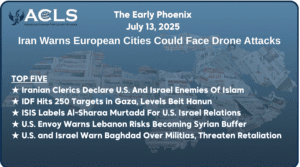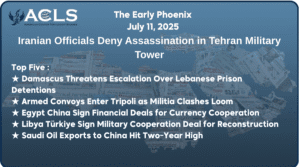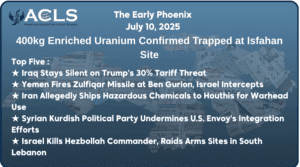The Region October 2- 2023
By: Rania Kisar
★ IRAN, ISRAEL, AND THE U.S.: From Satellites to Satire, Espionage to Oppression and Aggression, Iran Persists as the Region’s Foremost Critical Threat.
★ TURKIYE, IRAQ, SYRIA, AND THE U.S.: Ankara Bombing: A Critical Juncture in U.S.-Turkiye Relations and Global Geopolitics.
IRAN
★ From Satellites to Satire, Espionage to Oppression and Aggression, Iran Persists as the Region’s Foremost Critical Threat.
Key Takeaways:
- Iran’s satellite launch enhances intelligence and missile capabilities, escalating security concerns.
- Iranian naval forces’ provocative actions demand a robust response.
- Covert infiltrations into U.S. and German institutions pose direct threats.
- Tackling Iran’s Challenges: Discover the juxtaposition of Iran’s economic struggles with its leadership’s contradictions.
=================================
★ Military Report on Iran-Israel Relations and Developments
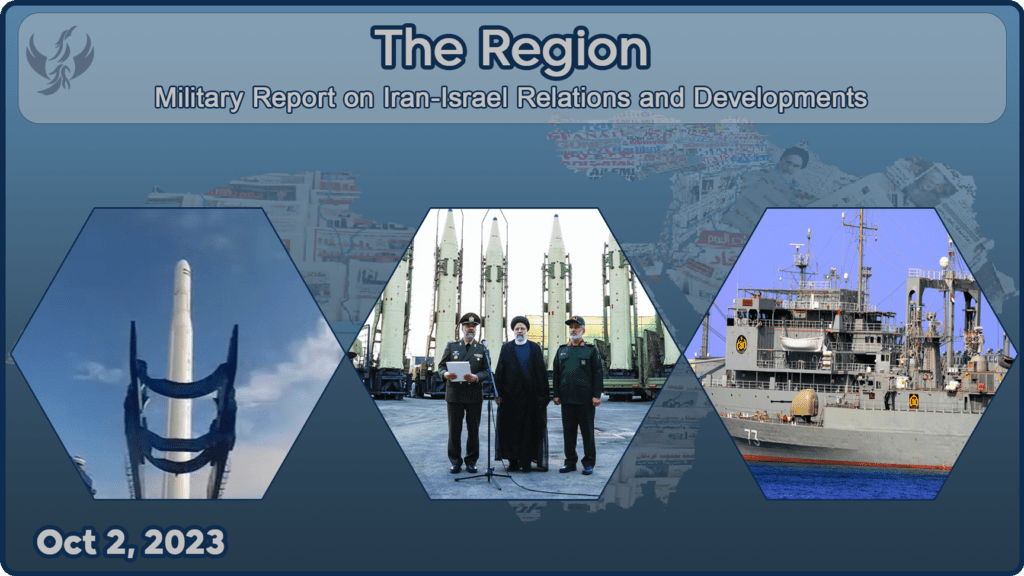
I. Satellite Launch and Ballistic Capabilities
The United States and Western countries have confirmed that Iran’s Revolutionary Guard successfully launched its third military imaging satellite, Noor-3, into orbit. The satellite, carried by a three-stage Qased rocket, is positioned 450 kilometers above Earth. The U.S. Space Force’s 18th Space Defense Squadron supplied data confirming the launch. This development follows a series of failed attempts by Iran’s civilian space program. The satellite aims to enhance Iran’s imaging capabilities for intelligence gathering. The launch has heightened tensions, as it is seen as aiding Tehran’s ballistic missile program amidst ongoing Western criticism and sanctions. Iran denies that the technology serves as a precursor to developing intercontinental ballistic missiles (Times of Israel, Sharq Awsat).
II. Internal Security and Intelligence Operations
Iranian media, although unverified, reported that Iran’s Ministry of Intelligence thwarted 30 planned bombings in Tehran. The ministry conducted raids in three provinces, arresting more than 28 civilians. The operational design and behavior of the arrested individuals were noted to be more advanced than typical ISIS methods. The ministry pointed to “well-known practices and mechanisms of the Zionist entity” as the external influence behind these operations. Confiscated materials included a significant amount of explosives, American-made pistols, and other equipment.
III. Missile Capabilities and Statements
On the same day as the internal security operations, Iran’s Ministry of Defense spokesperson, Reza Talaei, announced that Iran possesses missiles capable of striking Israel. One such missile, named after Qasem Soleimani, has a range of 1,400 kilometers and is fueled by solid fuel.
IV. Israeli Defense Activities
On October 1, the Israeli Defense Forces (IDF) conducted airstrikes near Damascus, targeting an Iranian weapons shipment en route to Lebanon. The strikes took place in al-Dimas, west of Damascus, and targeted locations belonging to the Syrian army and pro-Iranian militias. While the IDF does not traditionally comment on specific strikes, they have acknowledged conducting operations against Iran-backed groups, primarily to intercept arms shipments to Hezbollah. These strikes coincide with increased Iranian efforts to bolster anti-aircraft defenses in Syria (Sharq Awsat, Iran International, Bayan Media).
V. Naval Capabilities and Ambitions
Iran is actively working to enhance its naval capabilities. Plans are underway to upgrade the aging Sabalan frigate by installing 12 cruise missiles to improve its blue-water naval operations. Iran also claims to have received international orders for advanced destroyers like the Dena. The Sabalan destroyer has been armed with 12 anti-ship cruise missiles, an upgrade from its previous four. These missiles have a range of over 1,000 kilometers and are equipped with artificial intelligence for advanced trajectory definition and command-and-control systems. Iran also has ambitions to establish a permanent naval station in Antarctica for military and scientific operations (Jerusalem Post).
VI. U.S.-Iran Naval Encounters
In a recent incident, Iranian naval forces targeted a U.S. military helicopter, an AH-1Z Viper, with a laser during its routine flight over international waters in the Gulf. The helicopter is part of the unit deployed on the USS Bataan, which is in the region to deter Iran from seizing commercial tankers. U.S. Naval Forces Central Command reported no injuries or damages but condemned the act as “unsafe, unprofessional, and irresponsible.” Commander Rick Chernitzer emphasized that such actions risk lives and must cease immediately. This event adds to a growing list of tense encounters between U.S. and Iranian forces in the region (CBS News).
====================================
★ Iran’s Deepening Infiltration: From U.S. Academia to German Politics, a Global Web Unveiled
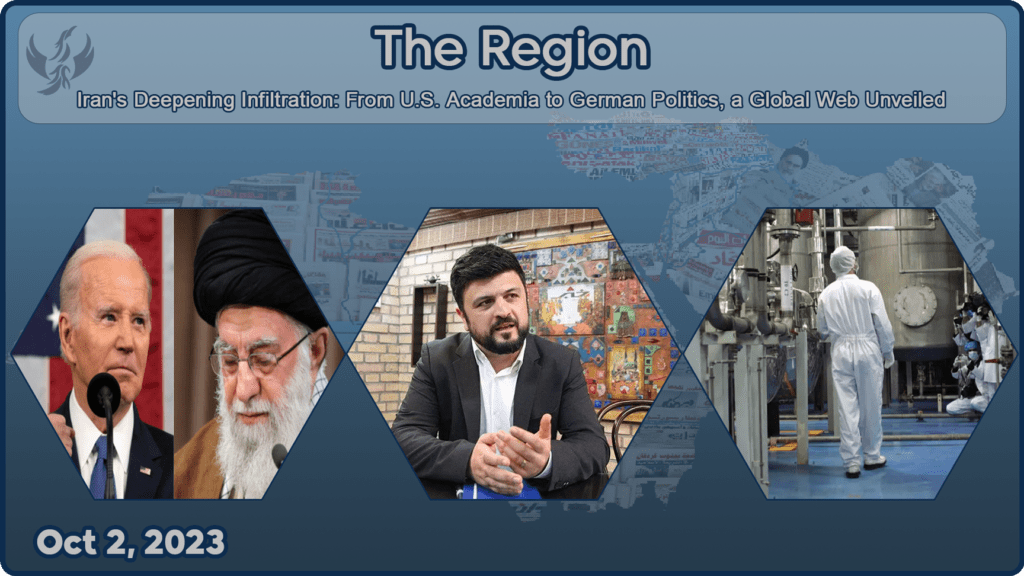
Following recent revelations about Iran’s infiltration into American academia, think tanks, and government bodies, German media are investigating the possibility of similar activities within Germany’s Ministry of Foreign Affairs and think tanks, creating a potential crisis for Foreign Minister Analena Baerbock.
Berliner Zeitung reported that Adnan Tabatabai, a frequent collaborator with the ministry often seen with Baerbock, may have acted as a ghostwriter for Iranian authorities. The publication also noted that Tabatabai’s think tank, Carpo, has received over one million euros in public tax funding for various dialogue projects. Die Welt stated that Germany’s Ministry of Foreign Affairs has not responded to inquiries about Tabatabai, raising concerns about the global influence of the Iran Experts Initiative (IEI). The ministry commented only that “previous project funding never resulted in privileged, exclusive, or advisory access to the Ministry.” (Iran International).
Domestically, recent claims suggest a more intricate connection between the “Tabatabaei” family and the Iranian regime than previously understood. Although no direct relationship between Ariana and Adnan Tabatabai has been confirmed yet, both have been cited in media platforms associated with the Mujahedin-e-Khalq (MEK) for publishing articles against the organization, which is reportedly Iran’s most feared opposition group. This suggests they have effectively advanced Tehran’s agenda over the years (StopFundamentalism.com).
Former UN inspector David Albright has endorsed these investigative efforts and advocates for a transparent dialogue concerning the actions of the implicated Iranian individuals.
More than 30 U.S. Senators have demanded the immediate suspension of Ariane Tabatabai’s security clearance. A letter to Secretary of Defense Lloyd Austin calls for swift action to protect the Department of Defense’s integrity. The letter notes that Tabatabai was criticized for echoing Iranian talking points as early as March 2021. Several House members had also requested a review of her security clearance in April 2021, which the Biden administration dismissed.
This development coincides with Senator Ben Cardin assuming the chairmanship of the Senate Foreign Relations Committee, a critical role in shaping U.S.-Iran policy. Initially skeptical of the 2015 JCPOA nuclear deal, Cardin later changed his stance after IAEA confirmations. He now advocates for “maximum pressure on Iran” to reach a new agreement, adding another layer of complexity to the ongoing U.S.-Iran debate.
Israel has expressed serious concerns about Iran’s successful infiltration into various U.S. sectors, including the Pentagon and ideological alliances within the American Democratic Party. Citing substantiated evidence like emails and memoirs, Israel warned that this infiltration poses a direct threat to U.S. national security and has the potential to manipulate American public opinion and policy. Immediate and comprehensive action is needed to identify and neutralize these covert networks to safeguard U.S. national interests (Jerusalem Post).
================================
★ The Imperative for Maximum Pressure: Iran’s Multifaceted Oppression as a Call to Action

As the world grapples with complex geopolitical challenges, the Iranian regime’s multifaceted oppression of its citizens stands as a glaring testament to the urgent need for maximum pressure policy. From the state-sanctioned blinding of protesters to the systematic closure of cultural hubs, the regime’s tactics are not merely violations of human rights; they are calculated strategies aimed at stifling dissent and perpetuating a culture of fear and silence. This report delves into the various oppressive measures employed by the Iranian government, highlighting why a robust maximum pressure policy is not just an option but a moral and strategic imperative.
- Cultural Suppression Through Cafe Closures
Iranian authorities have been closing cafes near Tehran University for 18 months to “protect Islamic-Iranian culture.” These closures have sparked criticism for stifling social hubs for students. A leaked letter from the university’s chancellor confirmed these actions, and Defa Press claimed some cafes were funded by European embassies (Iran International).
- Heavy-Handed Response to Zahedan Protests
Zahedan remains under heavy military security following the “Bloody Friday” anniversary, where over a hundred Sunni people were killed. Protests continue despite the arrests of at least 128 individuals, including 14 minors. Strikes have occurred in markets and shopping centers, and seven female political prisoners have expressed solidarity with the protesters (Bayan Media).
- Violent Suppression in Southeast Iran
Dozens were arrested in southeast Iran during the commemoration of another “Bloody Friday,” where 104 people were killed last year. The protests were sparked by allegations of rape and dress code violations. Security forces used live ammunition and tear gas, wounding at least 25 people, including children. Human rights groups have called for international accountability (Times of Israel).
===============================
The Region’s Comic Section
★ The Great Iranian Economic Mirage: When State Media Says ‘Boom,’ But Your Wallet Says ‘Bust
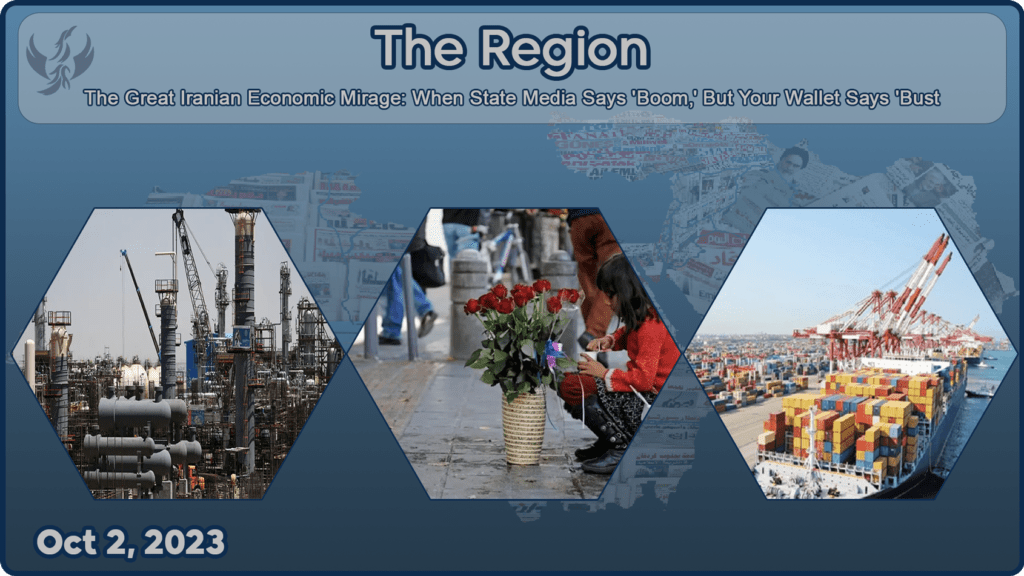
While Tasnim Agency and other Iranian state-affiliated media outlets paint a rosy picture of Iran’s economic status, the reality on the ground tells a different story. Tasnim’s reports of economic growth, increased oil production, and a promising transition to “BRICS PAY” are at odds with the grim economic landscape that independent studies and experts describe (Tasnim Agency).
A comprehensive study conducted in May 2023 reveals a far more troubling scenario. Iran’s Gross National Income (GNI) in 2021 was only 57% of what it was in 1976. The government’s inability to match population growth with adequate investment in education and job creation has led to skyrocketing unemployment and inflation rates. Astonishingly, only 27.5% of the population is formally employed, and it is estimated that the poverty rate exceeds 50% (Clingendael Magazine).
Further complicating Iran’s economic woes is its non-compliance with the Financial Action Task Force (FATF) standards on money laundering and financing of terrorism. Even if U.S. sanctions were lifted, Iran’s international trade would continue to suffer without FATF compliance. Previous attempts to adhere to these guidelines have been thwarted by hardline elements within the Iranian government, casting doubt on the country’s willingness to reform (Iran International).
Adding another layer of complexity are the quasi-government companies, known as parastatals. Initially created to evade international sanctions, these entities have become a liability. Operating without transparency and often involved in tax evasion, these companies have become significant players in the Iranian economy, further destabilizing it (Iran News Update).
The real victims of this economic crisis are the most vulnerable segments of the population. A staggering 15% of school-age children have been forced into the workforce due to escalating inflation and a 100% increase in commodity prices, making basic necessities unaffordable for many families (Iran International).
In conclusion, while state-affiliated media in Iran may project an image of economic resilience and growth, the facts speak otherwise. The Iranian economy is in a state of crisis, exacerbated by poor governance, lack of transparency, and international sanctions(Iran International).
===========================
★ Raisi’s Wife: A Buffet of Hypocrisy and Irony!
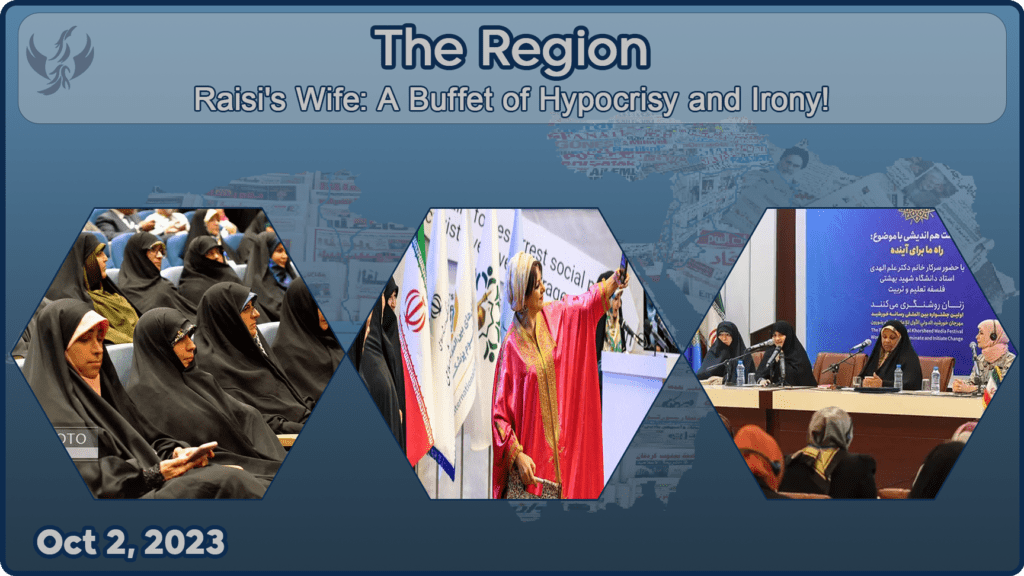
Oh, where do we even start with this comedy goldmine? So, Jamileh Alamolhoda, the wife of Iran’s President Ebrahim Raisi, got introduced as “Iran’s First Lady” at a women-in-media shindig. But wait, there’s a plot twist! She later says, “Hold my non-alcoholic champagne, the REAL First Lady is the Supreme Leader’s wife!” Cue the collective facepalms and the hardliners flipping their turbans going, “That’s more Western than a cowboy eating a Big Mac!” (Sharq Awsat).
But folks, it gets better. Alamolhoda wants to write a book à la Michelle Obama’s “Becoming.” Yes, you heard that right. It’s like a vegan deciding to write a cookbook inspired by a famous steak chef. Critics are having a field day, calling her out for a buffet of delicious, all-you-can-eat hypocrisy (Iran International).
So, to sum it all up: Iran’s got its own version of a sitcom unfolding. It’s a laugh-out-loud saga featuring a “First-ish Lady” who’s against Western feminism but wants to be the next Michelle Obama. It’s like watching someone protest fast food while secretly chowing down on a bucket of fried chicken. Ah, the delicious irony!
===========================
TURKIYE
★ Ankara Bombing: A Critical Juncture in U.S.-Turkiye Relations and Global Geopolitics
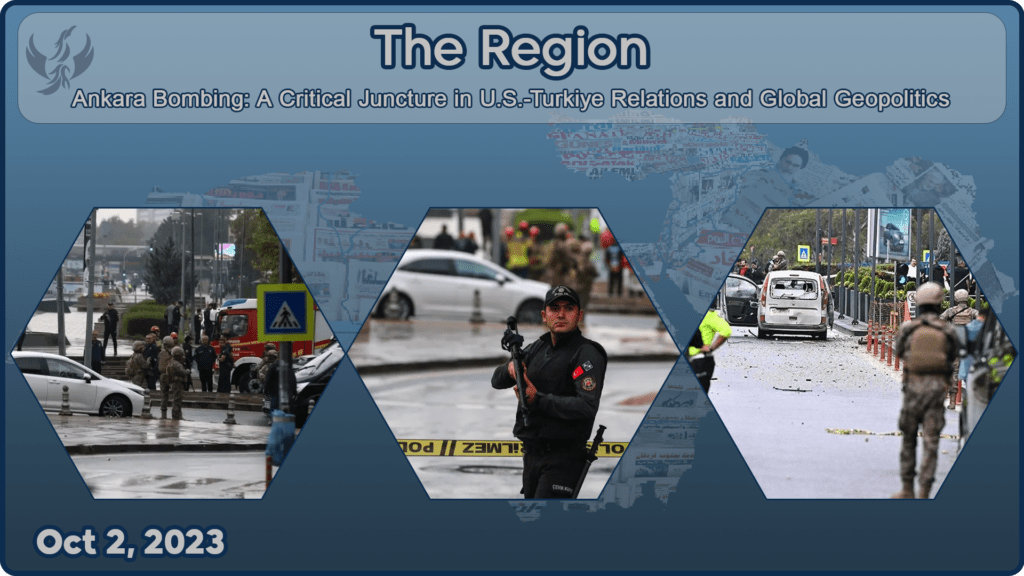
Ankara Attack:
On October 1, 2023, at approximately 9:30 a.m. local time, a suicide bombing occurred near the General Directorate of Security and the Parliament building in Ankara, Turkiye. The attack was executed by two individuals who arrived at the scene in a vehicle (Al Jazeera). One of the attackers detonated himself at the main gate of the building, while the other was shot in the head by security forces before he could detonate his own explosives (Al-Hadath). Two police officers were injured in the attack, sustaining non-life-threatening injuries (Anadolu Agency).
Claim of Responsibility:
The Kurdistan Workers’ Party (PKK), a group classified as a terrorist organization by Turkiye and Western countries, claimed responsibility for the attack. The PKK stated that the operation was carried out by a team affiliated with the Khaledin Brigade. Turkiye immediately responded to the attack by striking 20 alleged PKK military sites in north Iraq (Sharq Awsat).
Political Reactions:
Turkish President Recep Tayyip Erdogan, who was attending a parliamentary session nearby, stated that “terrorists will never achieve their goals,” emphasizing Turkiye’s resolve to continue its fight against terrorism (Anadolu Agency). The attack drew international condemnation, including from the U.S. Embassy in Ankara, European Council President Charles Michel, and several Arab nations (Daily Sabah).
Additional Details:
The vehicle used in the attack was hijacked in the city of Kayseri, 260 kilometers southeast of Ankara, and its driver was killed (Sharq Awsat). The attack was the first of its kind in Ankara since 2016 and occurred one kilometer from the site where President Erdogan was attending the opening of the new session of Parliament (Sharq Awsat). Surveillance footage showed one of the attackers exiting the vehicle and rushing towards the gate while firing a light weapon (Al Jazeera). Turkish authorities have launched an investigation into the attack and imposed a media ban on further coverage (Al Jazeera).
Roads leading to the Ministry of Interior and Parliament in Ankara were closed following the attack (Al Arabiya). This incident has led to heightened security measures and an ongoing investigation. It has also drawn a wide range of international reactions, emphasizing the global implications of such attacks.
★ Turkiye’s Possible Three-Pronged Responses: Military Escalations, NATO Cooperation, and U.S. Diplomatic Strains
- Increase Unilateral Military Operations in Iraq and Syria: Turkiye is likely to escalate its unilateral military operations in Iraq and Syria. The focus will likely be on targeting the PKK and affiliated groups, including the YPG in Syria, which Turkiye considers a terrorist organization. These operations carry the risk of affecting the fight against ISIS and may further complicate relations with NATO powers, potentially undermining the interests of the International Coalition.
- Urge NATO and the U.S. To Provide Concrete Cooperation in the Realms of Intelligence, Security, and Military Operations: The main aim for Turkiye is to transition its allies from diplomatic rhetoric to actionable plans that address the evolving security challenges in the region. To achieve this, the Turkish government may request deeper cooperation in intelligence and security. Furthermore, Turkiye may require approval for all of its military operations and demand non-interference.
- Exacerbate Diplomatic Tensions with the U.S.: The attack could significantly strain U.S.-Turkiye relations, with implications ranging from policy divergence to economic impact. U.S. support for the YPG, viewed by Turkiye as an extension of the PKK, could widen policy gaps and even risk military confrontations. Diplomatic talks may stall, affecting other areas of mutual interest such as trade and regional stability. Public opinion in Turkiye could turn against the U.S., complicating political cooperation. Turkiye might seek alternative alliances, diluting U.S. regional influence. Intelligence sharing could suffer, hampering counter-terrorism efforts. Lastly, escalating tensions could lead to economic sanctions, affecting bilateral trade and investment.
===================================
For more information contact: [email protected]

